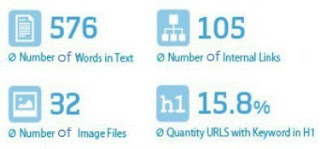Staff at Searchmetrics have released results of their 3-month long study, SEO Ranking Factors – Rank Correlation 2013 for Google USA. They evaluated the first 30 search results of 10,000 keywords, hence they analyzed 300,000 websites. They also carried out Navigational Searches, filtering largely brand search in order to deliver better result. They searched through titles, descriptions, links, content, Facebook likes and shares, tweets, PlusOnes and more.
Marcus Tober, founder of
Searchmetrics said that
Ranking Factor – Rank Correlation - US 2013 study, like last year, dealt with the definition and evaluation of factors that differentiate better-positioned websites from pages placed further back in the organic search results – i.e., pages that have a positive rank correlation. Compared to their
Google Ranking Factors US 2012 study, they taken significantly more ranking factors into account in their analysis.
Question studied by Searchmetrics:
What do web pages that are well-positioned by Google have in common and what distinguishes them from lower ranking pages?
What factors are playing a role?
You can find the most important factors in our overview of all rank correlation coefficients. These are all the factors we have analyzed and consider relevant. We have presented the relationship between
Google search results and the various factors influencing it using the Spearman correlation - a high positive correlation coefficient occurs for a factor if higher ranking pages have that feature / or more of that feature, while lower ranking pages do not / or have less of that feature. In addition to providing an overview of the changes in correlation since last year, we have extended our analysis in 2013 to include many relevant new factors.
Top highlights of 2013:
1. Keyword domains and keyword links have lost relevance
2. Brands are the exception to many rules
3. Social signals continue to correlate very well with better rankings
4. Good content is always important: it comes to quality!
5. The number of backlinks remains immensely important
6. On-page technology remains one of the basics
Following are the Deeper Insights into the Study:
1. Keyword links and domains have lost relevance
The importance of keywords in the URL / domain has significantly decreased as a ranking factor compared to 2012:
In our study, these two factors are considered the losers when compared with last year, because the existence of keywords in the URL and/or the domain have lost their relevance. This also affects backlinks when it comes to plain text keyword links. So it looks as if the days of "hard keyword optimization" are over. Google now puts much more emphasis on natural link profiles. Hard keyword links have lost significant influence and can probably – when used excessively – even have a negative effect; for example, when Google updates its algorithm with features devaluing bad links. Wondering what else has been happening in the field of keywords? Check out the complete version of the Ranking Factors – Rank Correlation study.
2. Brands are the exception to many rules
Last year, brands held a privileged position. This has also been confirmed in this year's study: for brands – and their websites – search engines do not seem to apply the same criteria as for other domains. For example, it seems as though Google considers it natural for brands to have comparatively more backlinks with the name of the brand in the link text alone – what we refer to as "brand links" – and still not be rated negatively.
3. Social signals continue to correlate very well with better rankings
The tendency over the years has been very positive – and this year’s study confirms the trend that became evident as early as 2012: well positioned URLs have a high number of likes, shares, tweets and plus ones and specific URLs stand out in the top search results with a very high mass of social signals. On one hand this means that the activity on social networks continues to increase, on the other hand it means that frequently shared content increasingly correlates with good rankings.
4. Good content is always important: it comes to quality!
For our analysis of content features, we have increased the number of factors significantly over the previous year:
Content factors correlate almost entirely positively with good rankings and were apparently – when compared with the previous year – partially upgraded. Good ranking URLs, to a certain extent have more text and a higher number of additional media integrations compared with 2012. A good internal link structure also appears to be an important quality attribute.
5. The number of backlinks remains immensely important
Backlinks continue to be one of the most important SEO metrics. In this regard, little has changed over the years: sites with more backlinks simply rank better. And this is also the result of our ranking factor study in 2013. However, factors around this metric are subject to evolution: not only are the quantity of backlinks important, but increasingly so is their quality! The backlink profile is nowadays regarded as a kind of conglomerate of very diverse quality factors that we discuss in detail in the study.
6. On-page technology remains one of the basics
The on-page factors surrounding the technical side of building web sites have long been one of the basics of a good search engine ranking – and this will continue. Even more, it seems to be fulfilling certain on-page criteria is not about achieving a favorable ranking, rather, it is the opposite: it is simply negative for the rankings when web pages do not meet criteria. On-page factors are therefore considered more of a prerequisite for ranking higher in search results pages.
The context of the Ranking Factors - Rank Correlation Study:
Search engines work with algorithms to evaluate websites by topic and relevance. On this basis the search engines create a structure for the total of all pages in the search engine index, which finally results in a best possible ranking for users’ search queries. The criteria for the evaluation of websites and the production of this ranking are generally referred to as ranking factors. Please note the difference between correlation and causation in this case. We do not make any statements about causal effects between factors and rankings, but we analyze correlations: and the coexistence of a factor and rankings indicates some kind of relationship.
For our study, we have undertaken a comprehensive data collection which enables the analysis of the Ranking Factors for Google USA in 2013 and also allows us to draw comparisons to our analysis of the Ranking Factors in 2012. This content is an overview of our detailed Ranking Factors – Rank Correlation 2013 study. The results are based on correlation and are not proof of any causal effects.
Keep in touch with latest SEO News by following Marcus Tober at
Goohle+ &
Twitter and by visiting
Searchmetrics SEO Blog.




























